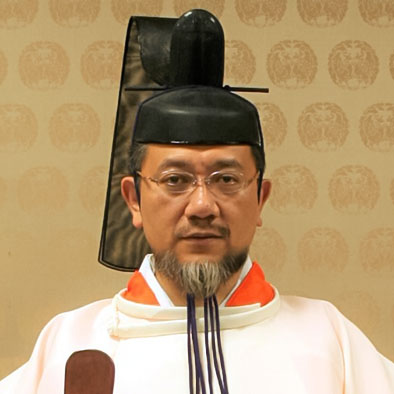パネリスト・モデレーター紹介

三宅 善信 師
Rt. Rev. Yoshinobu Miyake
第3セッション
「AIの脅威と責任」
パネリスト
経歴
1958年、大阪市生まれ。同志社大学大学院とハーバード大学世界宗教研究所で学ぶ。長年、金光教泉尾教会総長として諸宗教対話活動に従事。1997年、日本で最初の宗教情報専門ウェブサイトを運営する(株)レルネットを設、CEOに就任。(公財)WCRP日本委員会理事、大阪府宗教連盟常任理事、神道国際学会理事長、関西国連協会副本部長等を兼任。G20諸宗教フォーラム2019の運営委員長として尽力する。
Curriculum Vitae
Rt. Rev. Yoshinobu Miyake, born in 1958 into a well-known family of Shinto priests in Osaka, Japan.
He studied at Doshisha University in Kyoto and at Harvard Univ. and publishes frequently.
He took important rolls in his Shinto Church as Superior General.
For the past 40 years he has been active worldwide in the interfaith field.
In 1997 he established RELNET Corporation, whose website publishes widely on religion-related matters.
He serves as board member of Religions for Peace Japan, the Chair of the Board in International Shinto Studies Association, the Vice President of the UN Association Japan Kansai Capital, and so on.
Most Recently, he led G20 Interfaith Forum 2019 to success as the Chair of the Steering Committee.
梗概
数百年後の未来人が人類の文明史を振り返るとき、2017年という年はおそらく大きなエポックメイキングな年になっているであろう。それは何故かというと、二千数百年の歴史を有する東洋のボードゲームのひとつである囲碁(Go)において、人工知能(Artificial Intelligence: AI)が中国や韓国や日本においてそれぞれの国の名人(Grand Master)を凌駕したからである。正直言って、私は私が生きている間に、人工知能が囲碁や将棋といった深奥幽玄なゲームにおいて、幼少の頃から想像を絶するような修行をしてきたプロ棋士に勝つことができるようなソフトが開発されることは不可能だと思っていた。何故なら、囲碁や将棋のゲームソフトを開発する人自身の「棋力」は、プロ棋士の「棋力」には遠く及ばないので、いくらコンピュータの計算速度が速くなったところで、彼らの「棋力」が「アマチュア」レベルだからである。
「凡人」が開発したプログラムが「天才」を凌駕するには、発想や方法論上の「飛躍」が必要である。それが「ディープラーニング」という手法である。これは、人工知能に対して、人間がひとつひとつ「教える」のではなく、人工知能自らが、過去の膨大なプロ棋士同士の「棋譜」のデータにアクセスしてこれらから「学習」だけでなく、自分と自分同士で「対戦」して新しい「棋譜」を積み重ねていくのである。コンピュータには「肉体的な疲れ」がないので、1年365日24時間「学習」し続けることができる。そして、あるプログラムは、わずか2年間でこれまで何百万人という人間が残した棋譜の総量をはるかに上回る2000年分の対局をこなしたというのである。これでは、いかに天才的な人間であったとしても、叶うはずはない。その意味で、2017年は人工知能の歴史にとって、一種の「特異点」となった。
私がAIにおける「特異点」の問題を考えるときに、いつも心に想起するのが、皆さんよくご存じの旧約聖書の『創世記』第3章における「知恵の樹」のエピソードである。創造主(ヤハウェ・エロヒム)は、アダムとイブに対して「エデンの園に生えている全ての樹の実は食べても良いが、知恵の樹の実だけは食べることを禁じ」ていた。なぜなら知恵の樹の実を食べると必ず死ぬからである。ところが、実際には、アダムとイブは、この禁じられていた「知恵の樹」の実を食べたのに、死ぬことはなく、創造主を恐れて、身を隠そうとしたので、永遠のいのちと食糧を保証された「エデンの園」から追放された。そして、当然のことであるが、「善悪を知った」以上は、アダムとイブの子孫である人類は、自らの判断で行った行為に対して「責任」を追わなければならなくなった。
私がもうひとつ想起するのは、古代インドの聖典である『リグ・ヴェーダ(Rigveda)』に納められた以下の賛歌「つれだつ友なる二羽の鷲は、同一の木を抱けり。その一羽は甘き菩提樹の実を食らい、他の一羽は食らわずして注視す」である。この意味は、一方の鷲は、生・不生について、神意への問いかけをせず、神を試すようなことをせず、その結果、堕落しなかった。もう一方の鷲はひたすら菩提樹の実(存在本質の探求=神意)を貪り続けたことによって堕落したのである。
これら中東とインドという人類の古代文明揺籃(ようらん=ゆりかご)の地において、一神教と多神教というまったく発想を異にする二つの宗教的伝統が共に、人類と神との関係を壊すものが「知恵」であることに注目していることの意味は大きい。そして、遠い過去において、神と人間との間において発生した「特異点」が、今度は人間と人工知能との間おいて発生した。しかしながら、神は神の意志に反するかもしれない人間に自由意志を与え、その結果、人間が神に反したのであるから、その責任は神の側にあるとも言える。同様に、これから起こるであろう人工知能による数々の災厄の責任も、これを開発し、「ディープラーニング」という「知恵の樹」を人工知能に与えた人間が負ってしかるべきである。
Abstract
The year 2017 must be unquestionably the remarkable year when some in a couple of centuries would take a careful look at the history of humanity. Why…? Because AI (Artificial Intelligence) showed its superiority to any single Go master of China, Korea, and Japan in the over 2000 years lasting popular board game of East Asia. I have taken it for granted that AI is impossibly unable to knock the proficient master players out, who have devoted their whole life for the Go or Shogi board games of in-depth strategy and intelligence. As the game maker is far less-skilled than any master, the skill of the game maker is nothing different from that of an amateur even though a computer records its great achievement in its accounting speed.
How is it possible that AI defeated the Go masters? The answer is “deep learning.” By which, AI learns and practices in order to reach its excellence by addressing the enormous amount of data and experiencing games with itself. We surely teach AI nothing. A computer never gets exhausted, and thus it keeps learning for 24 hours every day. Reportedly, one program for merely 2 years has experienced more games than millions of players have enjoyed for 2 millenniums. Therefore, no genius can exercise as many games as the computer does. Accordingly, the year 2017 witnessed “singularity,” a distinguished shift change in the history of AI.
This great change reminds me of two scriptural stories. The one is the well-known “Paradise Lost” in Chapter 3 of the Book of Genesis. God creates Adam and Eve and warns them not to eat fruits of the tree of knowledge while they are allowed to have rest of the fruits in the Garden of Eden. The reason is eating the fruits of the tree leads them to death. Eventually, they ate the fruits, however, the fruits did not kill them. Then, as they tried to hide fearing the divine punishment, God banished them from the eternal Eden. In conclusion, we, the offspring of Adam and Eve, came to be responsible for our sins.
The other story I am highlighting is a paean found in the antique Indian Brahmanism scripture, the Rigveda. “The two friend eagles stay on the same tree. The one enjoys sweet fruits of the linden tree while the other just observes.” This means, the latter eagle did not fall as it did not challenge Deity by inquiring of Him good or evil. On the other hand, the former eagle fell because it devoured the fruit, which is a quest for the real essence, namely the divine will.
Here, I present an interesting point which should not be ignored. Both monotheist and polytheist traditions in the Middle East and India, in which dynamic civilizations emerged, imply knowledge is the termination of God-human relationship. Now, we are facing another distinct relationship between humanity and AI. In a sense, God is responsible for his inaccuracy that He gave human being their free will, and human being challenged God through their free will. How shall we handle the AI issue in our time? We are responsible for the unprecedented troubles AI would make since we gave AI the “tree of knowledge,” namely, “deep learning.”
